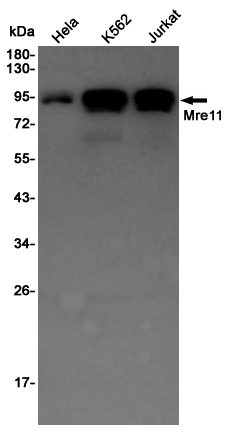
| WB | 咨询技术 | Human,Mouse,Rat |
| IF | 咨询技术 | Human,Mouse,Rat |
| IHC | 1/50-1/100 | Human,Mouse,Rat |
| ICC | 技术咨询 | Human,Mouse,Rat |
| FCM | 咨询技术 | Human,Mouse,Rat |
| Elisa | 咨询技术 | Human,Mouse,Rat |
| Aliases | MRE11 homolog 1; Meiotic recombination 11 homolog A; MRE11 homolog A; MRE11A; HNGS1; MRE11 |
| Entrez GeneID | 4361 |
| WB Predicted band size | Calculated MW: 81 kDa; Observed MW: 81 kDa |
| Host/Isotype | Rabbit IgG |
| Antibody Type | Primary antibody |
| Storage | Store at 4°C short term. Aliquot and store at -20°C long term. Avoid freeze/thaw cycles. |
| Species Reactivity | Human |
| Immunogen | A synthetic peptide of human Mre11 |
| Formulation | Purified antibody in TBS with 0.05% sodium azide,0.05%BSA and 50% glycerol. |
+ +
以下是关于Mre11抗体的3篇参考文献示例(文献信息为示例性概括,实际引用需核对原文):
---
1. **文献名称**: *"The Mre11 complex: at the crossroads of DNA repair and checkpoint signaling"*
**作者**: Stracker TH, et al.
**摘要**: 该研究详细描述了Mre11蛋白在DNA损伤修复中的作用,并开发了一种特异性识别Mre11的小鼠单克隆抗体。作者通过免疫印迹和免疫荧光实验验证了该抗体在人类细胞系中的特异性,证明其可用于检测Mre11的亚细胞定位及与其他修复蛋白的相互作用。
---
2. **文献名称**: *"Mre11 deficiency alters the early response to DNA double-strand breaks in human cells"*
**作者**: Uziel T, et al.
**摘要**: 研究利用兔源多克隆Mre11抗体(抗C端表位),通过免疫沉淀和共聚焦显微镜技术,揭示了Mre11缺失对DNA双链断裂(DSB)早期修复信号的影响。抗体特异性通过siRNA敲低实验验证,并用于分析患者细胞中Mre11的功能异常。
---
3. **文献名称**: *"Functional analysis of human Mre11 mutations in DNA repair and checkpoint signaling"*
**作者**: Williams RS, et al.
**摘要**: 本研究采用商品化Mre11抗体(如Abcam或Cell Signaling Technology的抗体),通过Western blot和免疫组化技术,评估了多种Mre11突变体蛋白的表达水平及稳定性。研究强调了抗体在筛选遗传性疾病(如共济失调-毛细血管扩张样疾病)相关突变中的诊断价值。
---
**提示**:实际文献检索可通过PubMed或Google Scholar以关键词“Mre11 antibody”、“Mre11 immunohistochemistry”或“Mre11 complex”查找,并关注抗体验证相关的实验部分(如Figure S1中的抗体特异性验证)。
**Background of the Mre11 Antibody**
The Mre11 antibody is a critical tool for studying the Mre11 protein, a central component of the MRN complex (Mre11-Rad50-Nbs1), which plays essential roles in DNA damage response and repair. Mre11 exhibits endonuclease and exonuclease activities, facilitating the resection of DNA double-strand breaks (DSBs) to initiate homologous recombination (HR) repair. It also contributes to telomere maintenance, meiotic recombination, and activation of checkpoint signaling. Dysregulation of Mre11 is linked to genomic instability, cancer predisposition, and disorders like ataxia-telangiectasia-like disorder (ATLD).
The Mre11 antibody is widely used in research to detect protein expression, localization, and interactions via techniques such as Western blotting, immunofluorescence, and immunoprecipitation. It helps assess MRN complex integrity and function in cellular contexts, including responses to ionizing radiation or chemotherapeutic agents. Specificity and validation are crucial, as cross-reactivity with related proteins may affect data interpretation.
Studies employing this antibody have advanced understanding of DNA repair mechanisms, cancer biology, and potential therapeutic targets. Its utility extends to clinical research, where Mre11 expression levels may serve as biomarkers for cancer prognosis or treatment resistance. Ongoing research continues to explore its role in maintaining genome stability and mitigating disease.
×